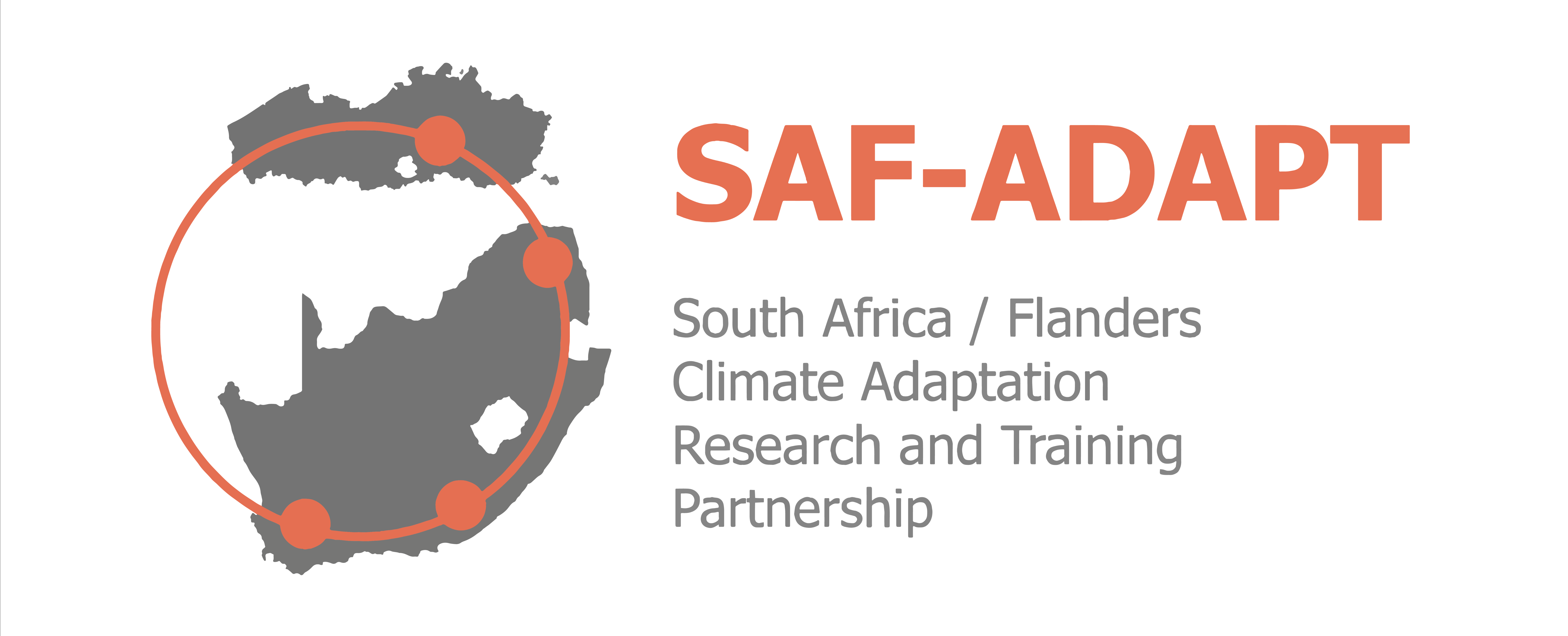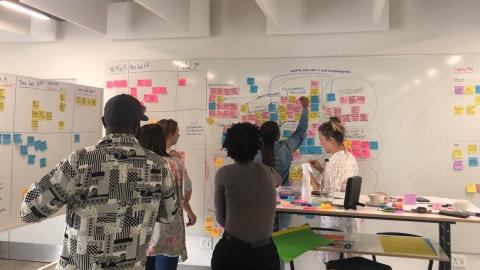
The South Africa / Flanders Climate Adaptation Research and Training Partnership (SAF-ADAPT) was funded by the Government of Flanders, and is a 4.5-year collaborative project between three South African universities (University of Cape Town, University of Fort Hare, and University of Venda); KLIMOS, a consortium of Belgian universities and research groups; and the South African Adaptation Network. It aimed to fill critical adaptation research gaps and enhance the capacity of South African universities and individuals, especially early career researchers, to generate and communicate research evidence for impact and build the capacity of those tasked with climate adaptation to deliver on their mandates.
South Africa faces considerable challenges adapting to climate change so as to achieve climate resilient development. This is a key pillar of the country’s commitment to the Sustainable Development Goals, as well as of its own National Development Plan and climate change response policies. In South Africa, the research capacity and evidence base focussed on climate change impacts is strong, but for adaptation, the number of well-trained researchers, the existing evidence base, and the capacity of policymakers and practitioners to apply this knowledge to build climate resilience is much less well-developed. There is, therefore, a need to strengthen adaptation research capacity, generate new research evidence to support adaptation, and build the adaptation community of practice across government, universities, NGOs, CBOs and the private sector.
Aims & Objectives
The SAF-ADAPT project aimed to strengthen the knowledge base for innovation in climate change adaptation in South Africa and enhance the country’s climate change response by connecting multiple actors in government, civil society, local communities, academia and the private sector.
The programme filled critical adaptation research gaps, enhanced the capacity of South African universities and individuals, especially early career researchers, to generate and communicate research evidence for impact, and built the capacity of those tasked with climate adaptation to deliver on their mandates.
The project supported the career development of historically disadvantaged South African researchers and practitioners, prioritising women wherever feasible.
Impact
The project had the following desired outcomes and impacts:
(i) Original, high-quality research on climate change adaptation within the South African context, that fills strategic knowledge gaps;
(ii) Productive research partnerships between Belgian and South African research institutions;
(iii) Training and graduation of historically disadvantaged South African research scientists who are capacitated to undertake climate change research; and
(iv) Increased awareness and knowledge of civil society, private sector, multilateral organisations and local communities about how to respond to climate change impacts, and to engage in transdisciplinary climate change research.
Activities
The SAF-ADAPT project included a number of activities organised around three themes:
Research
Research projects were undertaken by Masters students, PhD students and postdoctoral researchers, jointly supervised by senior academics from South Africa and Belgian partner universities.
Find all research outputs here
Capacity Building
Research activities were enhanced by research training programmes and inter-university student and staff exchanges, and government and civil society capacity building.
The SAF-ADAPT Summer Schools
As part of the SAF-ADAPT project, the summer school research skills programme was developed to strengthen the capacity of postgraduate and postdoctoral students to design and deliver impactful research while facilitating knowledge exchange between students and supervisors. Held over three years, each summer school focused on a different phase of the research process, supporting the quality, relevance, and impact of climate change research in an African context. The final year's event incorporated interdisciplinary learning, career development, and research communication, with students presenting their work for peer and mentor feedback. An Afrocentric, transformative approach underpinned the programme, ensuring that participants gained practical skills to navigate complex research challenges.
View the dedicated Summer School websites for 2022, 2023 and 2024.
Knowledge Translation
A key component of the programme is knowledge synthesis and communication, with networking activities to grow the knowledge and skills base for adaptation in South Africa.
Find all student-led research briefs here
SAF-ADAPT News & Highlights

ACDI hosts climate change focused workshop for local teachers

Evaluating the application of design thinking and systems thinking for climate adaptation and resilience
Launch of the SAF-ADAPT Project
Students
|
University |
Degree/Level |
Name |
Research Title |
|
UCT |
Masters |
Abenathi Mantshiyose |
|
|
UNIVEN |
Masters |
Hazel Shirinda |
Assessing the potential of biochar to restore degraded lands |
|
UNIVEN |
Masters |
Lily Munzhedzi |
|
|
UCT |
Masters |
Takalani Rabakali |
Impacts of climate change on the Berg River Voelvlei abstraction scheme |
|
UFH |
Masters |
Xolani Thobela Ntsonkota |
|
|
KU Leuven |
Masters |
Anna Van Eyck |
Multitemporal assessment of local climate zones in Cape Town, South Africa, using LANDSAT imagery |
|
KU Leuven |
Masters |
Ariana Bravo |
|
|
KU Leuven |
Masters |
Jonas Simons |
The impact of drought of drought stress in the fynbos ecosystem via remote sensing |
|
KU Leuven |
Masters |
Queenny Lopez |
Determining local ecosystem-driver dynamics of turning points in arid South-African savannas |
|
KU Leuven |
Masters |
Francisco Ramirez Castro |
|
|
KU Leuven |
Masters |
Hubert Claes |
Wildlife monitoring trough remote sensing in Tembe Elephant Park |
|
UFH |
Postdoc |
Zolisanani Mpanyaro |
|
|
UFH |
PhD |
Nomsa Fortunate Mapuka |
|
|
KU Leuven |
Masters |
Senne Spreij |
Identifying invasive plant species in fynbos vegetation with multispectral drone imagery |
|
KU Leuven |
Masters |
Jutta Meylemans |
An investigation of sustainable urban drainage systems to mitigate urban heat case of Cape Town, South Africa |
|
KU Leuven |
Masters |
Paul Jhon Diezon |
Assessment of Climate Change and Tree Growth using Tree-Ring Analysis in Northern KwaZulu-Natal, South Africa |
|
UCT |
PhD |
Lavinia Perumal |
The impact of roads on sub-Saharan African ecosystems: a systematic review |
|
UNIVEN |
Honours |
Lebyishe Mokeng Neptune |
The adaptation strategies to food insecurity in the rural households of Mulima village in the face of droughts |
|
UNIVEN |
Honours |
Letsoalo Maile |
Assessing the environmental impacts of land conversion over time in Mankweng and surrounding areas |
|
UNIVEN |
Honours |
Mohale Tshepang |
Farmers Perspectives on Factors Influencing the Adoption of sustainable Agricultural practices |
|
UCT |
Masters |
Tiro Nkemelang |
Attribution of influence of climate change on wildfire risk in South Africa |
|
UNIVEN |
Masters |
Lekgonono Humbulani |
Geospatial Analysis of the Role of Green Infrastructure in Mitigating Urban Flood Risk in Durban, KwaZulu-Natal Province |
|
UNIVEN |
Masters |
Maanda Mpfunzeni |
Establishment of Tithonia Diversifolia under extreme temperature and its management implications. |
|
KU Leuven |
Masters |
Caroll Mewa Fotso |
Exploring the relationship between local climate zones and human health in South African towns and cities |
|
UNIVEN |
Masters |
Pfarelo Nwanamidwa |
An analysis of climate change adaptation actions/plans for the Thulamela Municipality, Limpopo Province |
|
UFH |
Masters |
Lufume Sibonise |
Building/ strengthening agricultural extension services on climate smart technologies to support small scale farmers of the Eastern Cape |
|
UFH |
PhD |
Jonga Siyabonga |
|
|
UNIVEN |
PhD |
Anesu Gumbo |
Opportunities for environmental flow determination using functional flows approach for rivers in South Africa: A review. |
|
UCT |
PhD |
Khothatso Mokhele |
Adaptation pathways for the Food-Energy-Water nexus in South Africa |
|
UNIVEN |
Postdoc |
Ephias Mugari |
Ecosystems-based Disaster Risk Reduaction (Eco-DRR), Climate Change Adaptation ad Climate resilient Development in Limpopo Province |
|
UCT |
Postdoc |
Ffion Atkins |
A review of research on grounwater and climate change in South Africa |
|
UCT |
Postdoc |
Anna Taylor |
Groundwater governance in water stressed cities |
Project Team
Project Leads
Prof Mark New (ACDI), Research Lead from UCT (mark.new@uct.ac.za)
Dr Leocadia Zhou (UFH), Research Lead from UFH (Lzhou@ufh.ac.za)
Dr NS Nethengwe (UNIVEN), Research Lead from UNIVEN (nthaduleni.nethengwe@univen.ac.za)
Dr Bruno Verbist (KLIMOS), Research Lead from KU Leuven (bruno.verbist@kuleuven.be)
Michelle Shields, Communications from UCT (michelle.shields@uct.ac.za)
Project Partners
The SAF-ADAPT project was co-implemented by a consortium of four university partners, and the Adaptation Network. Each university partner brought complementary research and capacity building expertise across the natural and social sciences, and communication and advice at the research-policy interface. The South African institutions had a good regional spread, covering three provinces across South Africa, and bring existing links to national, provincial and local government.
KLIMOS brought together a network of Belgian university partners that have existing links to South Africa, as well as other developing country regions, enabling experiences from across the global South to fertilise research in South Africa.
The Adaptation Network was the main CCA community of practice in South Africa, and so played a crucial role in dissemination of project information to a wide community, and offered expertise for capacity building and outreach activities.
The African Climate & Development Initiative (ACDI) based at the University of Cape Town (UCT) coordinates and leads interdisciplinary research and training across seven faculties and over twenty specialized research centres at the University of Cape Town. It also has strong partnerships across South and Southern Africa and was recently awarded ‘Centre of Excellence’ (CoE) status for ‘Climate and Development’ alongside partners at the Universities of Nairobi and Ghana by the African Research Universities Alliance (ARUA). ACDI’s research informs local, national and international decision making, in both adaptation and mitigation spheres. This experience in transdisciplinary research and project (including financial) management makes ACDI ideally placed to lead this consortium.
The School of Environmental Sciences, based at the University of Venda (UNIVEN), provides professional training in environmental sciences and undertakes applied research that links the University to the needs of the region, nation and the international community. It has a strong track record in participating in international collaborations, and strong research expertise in rural livelihoods, climate change and modelling, water quality assessment, land use planning, waste management, natural resource management, fire ecology and management, disaster risk reduction, environmental impact assessment, mining impacts, health and safety and as well as the application of GIS and remote sensing in most of the areas specified. This interdisciplinary expertise is housed in the Departments of Geography and Geoinformation Sciences, Ecology and Resource Management, Hydrology & Water Resources, Urban and Regional Planning and Mining & Environmental Geology.
The Risk & Vulnerability Science Centre (RVSC), based at the University of Fort Hare (UFH) conducts research in, and provides services for, assessment of down-stream global change risks and the effects on human well-being. It also undertakes evidence-based policy making, produces tools for decision making in disaster risk management and for risk and vulnerability assessment in the planning of development projects/programmes. A focus of the unit is to promote coordination of communities, municipalities, institutions of higher learning and government departments towards sustainable economic development.
KLIMOS is a Belgian interdisciplinary and inter-university research platform, which generates capacity to enable the necessary transition to a sustainable society through research for development. Eight research groups from six different universities and university colleges are involved. KLIMOS carries out multiple case studies in the Global South and has developed an environmental sustainability toolkit in support of environmental mainstreaming in development cooperation. KLIMOS is led by the Division of Forest, Nature & Landscape (FNL) at the Department of Earth and Environmental Services (EES), KULeuven. Other member university partners include: Vrije Universiteit Brussel; Université Libre de Bruxelles; Universiteit Gent; Universiteit Antwerpen and Université Catholique de Louvain.
The SA Adaption Network supports inclusive development by inter alia: i) promoting knowledge sharing and partnerships amongst practitioners and institutions engaged in developing and applying the theory and practice of adaptation to climatic variability and change; ii) acting as a forum for sharing resources, knowledge and ideas and promoting the integration of different kinds of knowledge; and ii) acting as a recognised point of contact for consultation, lobbying and advocacy.
Funder
